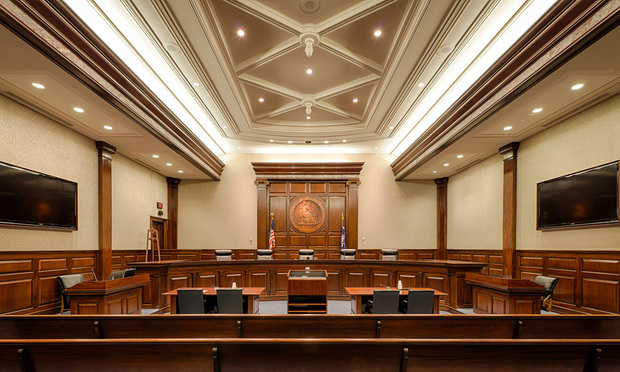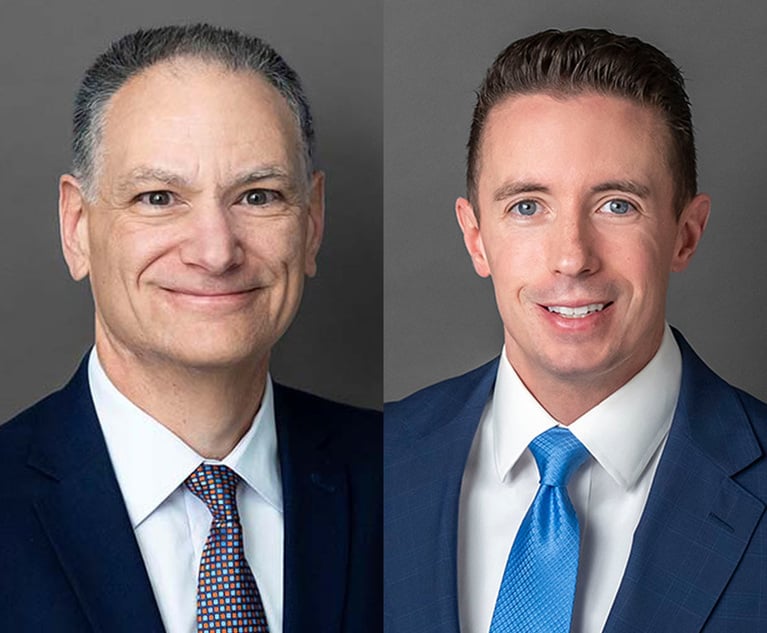'Do Court Employees Stand Alone' Without Civil Rights Protections, Lawyer Asks Pa. Justices
The Pennsylvania General Assembly intended to extend the protections of the Pennsylvania Human Relations Act to all employees, including employees of the state's judicial system, an attorney argued before the state Supreme Court on Thursday in a case that could change the way court workers can bring discrimination and wrongful termination claims against the judiciary.
November 21, 2019 at 06:00 PM
4 minute read
 (Photo: Shutterstock.com)
(Photo: Shutterstock.com)
The Pennsylvania General Assembly intended to extend the protections of the Pennsylvania Human Relations Act to all employees, including employees of the state's judicial system, an attorney argued before the state Supreme Court on Thursday in a case that could change the way court workers can bring discrimination and wrongful termination claims against the judiciary.
Hahalis & Kounoupis attorney David Deratzian, who represented the plaintiff in Renner v. Court of Common Pleas of Lehigh County, told the justices Thursday that the legislature intended to waive immunities for all "commonwealth" agencies—including the judiciary—when it enacted the PHRA, and, although caselaw holds that the Human Relations Commission cannot handle claims against the judiciary due to the separation of powers, the judiciary itself can adjudicate these claims under the PHRA, which, he argued, provides for greater protections for employees.
"Do court employees stand alone … as not being protected by the Pennsylvania Human Relations Act?" Deratzian asked.
The case stems from charges Lehigh County parole officer Michael Renner filed with both the Equal Employment Opportunity Commission and the Pennsylvania Human Relations Commission alleging unlawful discrimination by the Lehigh County Court of Common Pleas.
According to court documents, Renner alleged he was subjected to a hostile work environment while a parole officer, and was eventually fired after taking a medical leave. Renner, court documents said, protested the termination to the Lehigh County court president judge, who was the appeals officer, but the judge refused to take action.
Renner, court records said, then became a police officer, but, he alleged that the court continued to interfere with his employment, including barring him from carrying a gun or taser in the court and providing false and misleading job references. Renner eventually sued the court, as well as county officials, but the trial court dismissed the case at the preliminary objections stage. Renner appealed to the Commonwealth Court, which issued a per curiam order in October 2018 affirming the decision.
The appeals court relied on the Supreme Court's 1999 decision in First Judicial District of Pennsylvania v. Pennsylvania Human Relations Commission to determine that "because the Common Pleas court is a part of the judiciary, it is not subject to the PHRA."
However, according to Deratzian, the caselaw on which the Commonwealth Court based its decision has only held that the Human Relations Commission is unable to investigate or adjudicate claims, not that the judiciary is immune from suit under the law.
Justices Christine Donohue and Kevin Dougherty both pushed back against Deratzian's argument, saying the judiciary already has a "robust" process for dealing with these claims. Donohue further said the construct Deratzian was suggesting was "nonsensical" because people bringing discrimination and wrongful termination claims are entitled to have their cases heard by juries.
Deratzian, however, said there was no guarantee to a remedy under the current process, and no redress if a president judge refuses to consider a claimant's case. Further, he contended, the lack of remedy for court employees under these claims conflicted with the constitutional protections against discrimination.
Attorney Robert Krandel of the Administrative Office of Pennsylvania Courts' arguments jibed with Donohue and Dougherty's assertions that current procedures already provide for adequate remedies and avenues for judicial review.
Justice David Wecht, however, questioned whether it mattered that the state's policy does not outline that the claimant is entitled to money damages or attorney fees.
Krandel said he did not think it did since the rules do not specifically bar those remedies.
"If the court feels it needs to do anything … all it needs to do is highlight this policy," Krandel said.
This content has been archived. It is available through our partners, LexisNexis® and Bloomberg Law.
To view this content, please continue to their sites.
Not a Lexis Subscriber?
Subscribe Now
Not a Bloomberg Law Subscriber?
Subscribe Now
NOT FOR REPRINT
© 2025 ALM Global, LLC, All Rights Reserved. Request academic re-use from www.copyright.com. All other uses, submit a request to [email protected]. For more information visit Asset & Logo Licensing.
You Might Like
View All

Ozempic Defendants Seek to Shave 'Tacked On' Claims From MDL Complaint
3 minute read

Lawsuit Against Major Food Brands Could Be Sign of Emerging Litigation Over Processed Foods
3 minute readTrending Stories
- 1Law Firms Report Wide Growth, Successful Billing Rate Increases and Less Merger Interest
- 2CLOs Face Mounting Pressure as Risks Mushroom and Job Duties Expand
- 3X Faces Intense Scrutiny as EU Investigation Races to Conclusion & Looming Court Battle
- 4'Nation Is in Trouble': NY Lawmakers Advance Bill to Set Parameters for Shielding Juror IDs in Criminal Matters
- 5Margolis Edelstein Broadens Leadership With New Co-Managing Partner
Who Got The Work
J. Brugh Lower of Gibbons has entered an appearance for industrial equipment supplier Devco Corporation in a pending trademark infringement lawsuit. The suit, accusing the defendant of selling knock-off Graco products, was filed Dec. 18 in New Jersey District Court by Rivkin Radler on behalf of Graco Inc. and Graco Minnesota. The case, assigned to U.S. District Judge Zahid N. Quraishi, is 3:24-cv-11294, Graco Inc. et al v. Devco Corporation.
Who Got The Work
Rebecca Maller-Stein and Kent A. Yalowitz of Arnold & Porter Kaye Scholer have entered their appearances for Hanaco Venture Capital and its executives, Lior Prosor and David Frankel, in a pending securities lawsuit. The action, filed on Dec. 24 in New York Southern District Court by Zell, Aron & Co. on behalf of Goldeneye Advisors, accuses the defendants of negligently and fraudulently managing the plaintiff's $1 million investment. The case, assigned to U.S. District Judge Vernon S. Broderick, is 1:24-cv-09918, Goldeneye Advisors, LLC v. Hanaco Venture Capital, Ltd. et al.
Who Got The Work
Attorneys from A&O Shearman has stepped in as defense counsel for Toronto-Dominion Bank and other defendants in a pending securities class action. The suit, filed Dec. 11 in New York Southern District Court by Bleichmar Fonti & Auld, accuses the defendants of concealing the bank's 'pervasive' deficiencies in regards to its compliance with the Bank Secrecy Act and the quality of its anti-money laundering controls. The case, assigned to U.S. District Judge Arun Subramanian, is 1:24-cv-09445, Gonzalez v. The Toronto-Dominion Bank et al.
Who Got The Work
Crown Castle International, a Pennsylvania company providing shared communications infrastructure, has turned to Luke D. Wolf of Gordon Rees Scully Mansukhani to fend off a pending breach-of-contract lawsuit. The court action, filed Nov. 25 in Michigan Eastern District Court by Hooper Hathaway PC on behalf of The Town Residences LLC, accuses Crown Castle of failing to transfer approximately $30,000 in utility payments from T-Mobile in breach of a roof-top lease and assignment agreement. The case, assigned to U.S. District Judge Susan K. Declercq, is 2:24-cv-13131, The Town Residences LLC v. T-Mobile US, Inc. et al.
Who Got The Work
Wilfred P. Coronato and Daniel M. Schwartz of McCarter & English have stepped in as defense counsel to Electrolux Home Products Inc. in a pending product liability lawsuit. The court action, filed Nov. 26 in New York Eastern District Court by Poulos Lopiccolo PC and Nagel Rice LLP on behalf of David Stern, alleges that the defendant's refrigerators’ drawers and shelving repeatedly break and fall apart within months after purchase. The case, assigned to U.S. District Judge Joan M. Azrack, is 2:24-cv-08204, Stern v. Electrolux Home Products, Inc.
Featured Firms
Law Offices of Gary Martin Hays & Associates, P.C.
(470) 294-1674
Law Offices of Mark E. Salomone
(857) 444-6468
Smith & Hassler
(713) 739-1250





